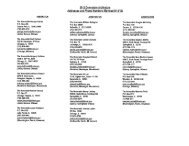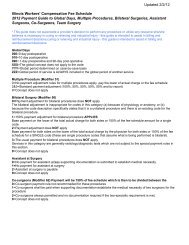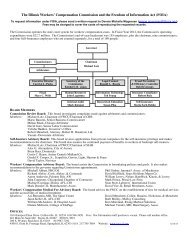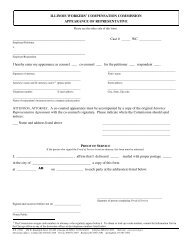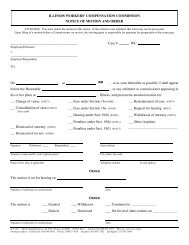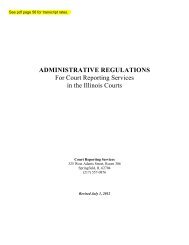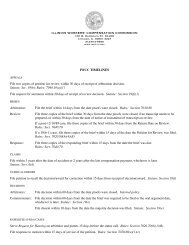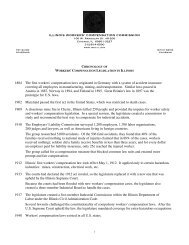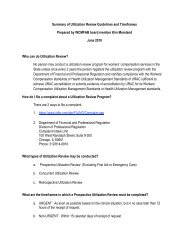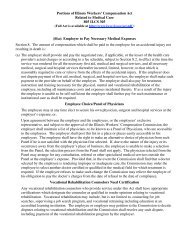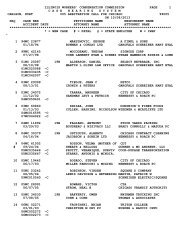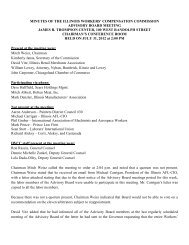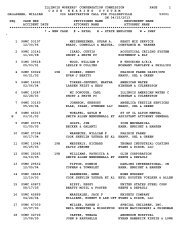illinois workers' compensation commission - IWCC - State of Illinois
illinois workers' compensation commission - IWCC - State of Illinois
illinois workers' compensation commission - IWCC - State of Illinois
Create successful ePaper yourself
Turn your PDF publications into a flip-book with our unique Google optimized e-Paper software.
INSURANCE<br />
Employers are responsible for the payment <strong>of</strong> benefits to injured workers; they must either purchase<br />
insurance or obtain permission to self-insure.<br />
INSURANCE<br />
The <strong>workers'</strong> <strong>compensation</strong> insurance business in <strong>Illinois</strong> is pr<strong>of</strong>itable and highly competitive. More<br />
insurance companies sell <strong>workers'</strong> <strong>compensation</strong> policies in <strong>Illinois</strong> than in any other state. 1 And, over the<br />
last 10 years, the number <strong>of</strong> companies selling w.c policies in <strong>Illinois</strong> actually increased 10%. 2<br />
The National Council on Compensation Insurance, a private organization, issues advisory insurance rates.<br />
<strong>Illinois</strong> carriers are free to set their own rates, and use the advisory rate in their calculations.<br />
Using the NCCI advisory rates, a premium <strong>of</strong> $100 in 1990 would cost only $104.32 in 2007. After<br />
adjusting for inflation, the 2007 advisory rate actually represents a 34% decrease in costs. 3<br />
INSURANCE COMPLIANCE PROGRAM<br />
<strong>Illinois</strong> law requires employers to insure themselves for their <strong>workers'</strong> <strong>compensation</strong> liabilities, but some<br />
employers fail to comply. These employers enjoy an unfair competitive advantage over law-abiding<br />
companies, while leaving their employees vulnerable if accidents should occur.<br />
If the Commission finds an employer knowingly and willfully failed to obtain insurance, it may be fined up<br />
to $500 for every day <strong>of</strong> noncompliance, with a minimum fine <strong>of</strong> $10,000. Corporate <strong>of</strong>ficers may be held<br />
personally liable if the company fails to pay the fine.<br />
Under legislation that took effect July 20, 2005, an employer may also face criminal charges and/or a workstop<br />
order for failing to obtain <strong>workers'</strong> <strong>compensation</strong> insurance.<br />
In FY06, the Commission hired a former prosecutor to run the Insurance Compliance Division. The unit<br />
brought 31 employers, with 467 employees, into compliance, and collected $156,467 from employers found<br />
to be operating without insurance. (Note: In FY07, we collected over $1 million in penalties.)<br />
Pursuant to the 2005 reform legislation, fines are deposited into the newly created Injured Workers’ Benefit<br />
Fund, which then pays benefits to injured workers whose uninsured employers fail to pay.<br />
BALANCE BILLING<br />
By law, employers are responsible for the payment <strong>of</strong> all medical services reasonably necessary to cure or<br />
relieve the injured worker from the effects <strong>of</strong> the injury. In some cases, however, the medical provider or<br />
insurer will try to get the injured worker to pay any unpaid balances <strong>of</strong> medical bills. Workers may be<br />
pursued by collection agencies, and their credit records may be damaged, for bills that were never their<br />
responsibility.<br />
The legislation that took effect July 20, 2005 contains a balance billing provision. If an employee informs<br />
the medical provider that a claim is on file at the Commission, the provider must cease all efforts to collect<br />
payment from the employee. Any statute <strong>of</strong> limitations applicable to the provider's efforts to collect from the<br />
employee is tolled from the date that the employee files the application with the Commission until the date<br />
that the provider is permitted to resume collection.<br />
When an employee notifies a medical provider that the treatment or service is for a work-related injury, the<br />
provider shall bill the employer directly. If the employer does not dispute payment <strong>of</strong> first aid, medical,<br />
surgical, or hospital services, Section 8(a) provides that the employer shall make payment directly to the<br />
provider on behalf <strong>of</strong> the employee. The employer shall pay the bill within 60 days <strong>of</strong> receipt <strong>of</strong> the bill as<br />
long as the claim contains substantially all the required data elements necessary to adjudicate the bills.<br />
8



